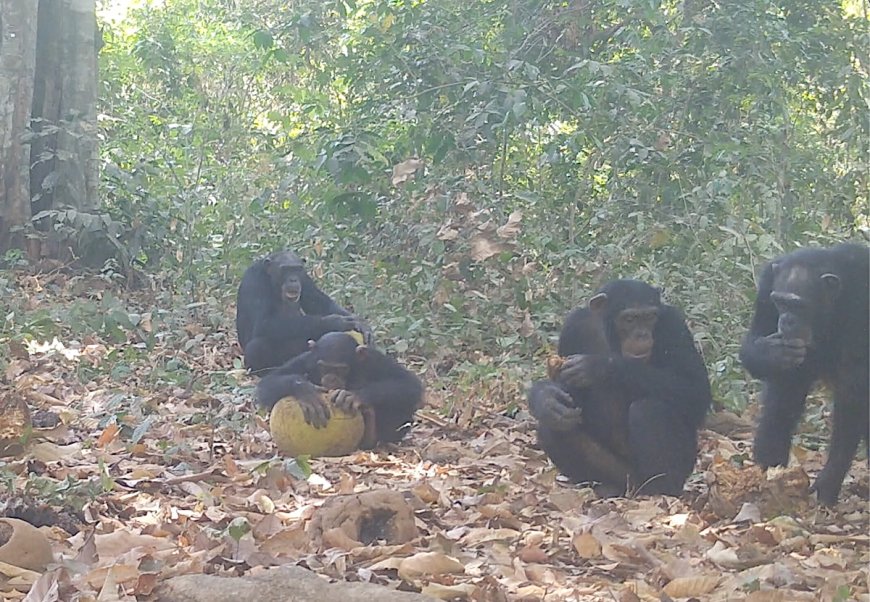Wild Chimpanzees Captured on Camera Eating and Sharing Fermented Fruits
Wild chimpanzees have for the first time been captured on camera eating and sharing fermented African breadfruit (Treculia africana) containing alcohol. The discovery was made by researchers who set up cameras in Guinea-Bissau’s Cantanhez National Park and raises questions about why chimps seek out alcohol and if they do so deliberately. “For humans, we know […] The post Wild Chimpanzees Captured on Camera Eating and Sharing Fermented Fruits appeared first on EcoWatch.

Wild chimpanzees have for the first time been captured on camera eating and sharing fermented African breadfruit (Treculia africana) containing alcohol.
The discovery was made by researchers who set up cameras in Guinea-Bissau’s Cantanhez National Park and raises questions about why chimps seek out alcohol and if they do so deliberately.
“For humans, we know that drinking alcohol leads to a release of dopamine and endorphins, and resulting feelings of happiness and relaxation,” said lead author of the study Anna Bowland, a PhD student with the Centre for Ecology and Conservation at University of Exeter, in a press release from the university. “We also know that sharing alcohol – including through traditions such as feasting – helps to form and strengthen social bonds. So – now we know that wild chimpanzees are eating and sharing ethanolic fruits – the question is: could they be getting similar benefits?”
Happy to share our new paper 'Wild chimpanzees share fermented fruits' @currentbiology.bsky.social Thank you to the amazing team. @kjhockings.bsky.social @joanahbessa.bsky.social , @xavh.bsky.social, Marina Ramon, Elena Bersacola, Matthew Carrigan, @amelinlab.bsky.social . @uniexecec.bsky.social
[image or embed]— Anna Bowland (@acbowland.bsky.social) April 21, 2025 at 3:59 PM
The research team filmed the chimpanzees using motion-activated cameras, which caught them sharing fermented fruit on 10 different occasions.
The team tested the fruit the chimps shared for alcohol content and found that the highest level was equal to 0.61 percent Alcohol By Volume — a measurement used for alcoholic drinks — a relatively low amount.
The researchers said it could just be the “tip of the iceberg,” however, since 60 to 85 percent of the chimpanzees’ diet consists of fruit, so a low alcohol content across a variety of foods could add up.
The team pointed out that chimps were unlikely to get “drunk,” since being in that state would not help their chances of survival.
“Widespread plant food sharing in great apes and the recent confirmation of ethanol presence in diverse fruit species suggest the sharing, and dietary incorporation, of ethanol-containing foods is extensive and may have played a long-standing role in hominoid societies. Trees of T. africana extend throughout Africa, and at several chimpanzee sites fruits of this species are an important food source,” the authors of the paper wrote.
How alcohol affects the metabolism of chimpanzees is not currently known. However, a recently discovered molecular adaptation that increases ethanol metabolism in African apes’ common ancestor suggests consuming fermented fruits could have ancient origins in chimpanzees and humans.
“Chimps don’t share food all the time, so this behaviour with fermented fruit might be important,” said co-author of the paper Dr. Kimberley Hockings, a lecturer at University of Exeter, in the press release. “We need to find out more about whether they deliberately seek out ethanolic fruits and how they metabolise it, but this behaviour could be the early evolutionary stages of ‘feasting.’ If so, it suggests the human tradition of feasting may have its origins deep in our evolutionary history.”
The study’s findings, “Wild chimpanzees share fermented fruits,” were published in the journal Current Biology.
The post Wild Chimpanzees Captured on Camera Eating and Sharing Fermented Fruits appeared first on EcoWatch.



















































